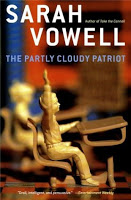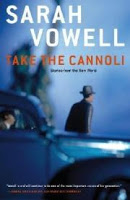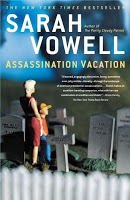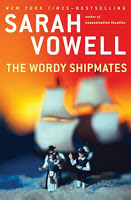Flipping through some publishing promotion recently, I was pleased to come across notice of a forthcoming title from American pop culturist and historian Sarah Vowell.
 Vowell isn’t what you traditionally picture when you hear the word historian (although now that I say that I’m not sure really whose image is summoned up at the utterance of the word historian, but I’m still pretty sure it’s not Vowell). She’s been actively writing about and talking about history in the American press for the last 15 years or so: starting when she was in her twenties. Her approach to history has a pop-culture feel, but without sacrificing the research or facts. Her books read like having a conversation with a passionate, knowledgeable but extremely sarcastic friend.
Vowell isn’t what you traditionally picture when you hear the word historian (although now that I say that I’m not sure really whose image is summoned up at the utterance of the word historian, but I’m still pretty sure it’s not Vowell). She’s been actively writing about and talking about history in the American press for the last 15 years or so: starting when she was in her twenties. Her approach to history has a pop-culture feel, but without sacrificing the research or facts. Her books read like having a conversation with a passionate, knowledgeable but extremely sarcastic friend.

 Vowell’s books have become more historically focused as she’s progressed through her career. Her earliest books were collections of essays, some of which focused on history and others of which contained more contemporary elements. Take the Cannoli and The Partly Cloudy Patriot might be more correctly called Americana, although many of the essays have historical elements.
Vowell’s books have become more historically focused as she’s progressed through her career. Her earliest books were collections of essays, some of which focused on history and others of which contained more contemporary elements. Take the Cannoli and The Partly Cloudy Patriot might be more correctly called Americana, although many of the essays have historical elements.
Beginning in 2005 with her travel memoir Assassination Vacation, Vowell has become more and more directly focused on history. Assassination Vacation documents her travels across the US visiting sites related to presidential assassinations. Publishers Weekly called it “history at its most morbid and most fascinating”, I would add outlandish as well.

 In 2009, Vowell published a book on Puritan New England called The Wordy Shipmates. Apparently she has been obsessed with the Puritans since childhood, and with this book she had the chance to channel those years of interest. But perhaps what is most interesting in this book is how Vowell draws a line from 17th Century New England directly to modern America, showing ways that even now American culture is influenced by its Puritan roots.
In 2009, Vowell published a book on Puritan New England called The Wordy Shipmates. Apparently she has been obsessed with the Puritans since childhood, and with this book she had the chance to channel those years of interest. But perhaps what is most interesting in this book is how Vowell draws a line from 17th Century New England directly to modern America, showing ways that even now American culture is influenced by its Puritan roots.
 Her forthcoming book? Unfamiliar Fishes will be released in March. In this book, Vowell turns her eye to Hawaii and its annexation by America in 1898. The publisher says “With her trademark smart-alecky insights and reporting, Vowell lights out to discover the off, emblematic, and exceptional history of the fiftieth state, and in so doing finds America, warts and all.” Like with many of the topics I’ve read about in Vowell’s works, its not something I know much about currently: but I’m confident I will soon.
Her forthcoming book? Unfamiliar Fishes will be released in March. In this book, Vowell turns her eye to Hawaii and its annexation by America in 1898. The publisher says “With her trademark smart-alecky insights and reporting, Vowell lights out to discover the off, emblematic, and exceptional history of the fiftieth state, and in so doing finds America, warts and all.” Like with many of the topics I’ve read about in Vowell’s works, its not something I know much about currently: but I’m confident I will soon.
Vowell has some David Sedaris-like qualities. If you’re a fan of his hilarious, irreverent essays, you might like Vowell’s take on history. Like Sedaris, she’s a regular NPR contributor: you might know her name from her contributions to This American Life or other programs.



